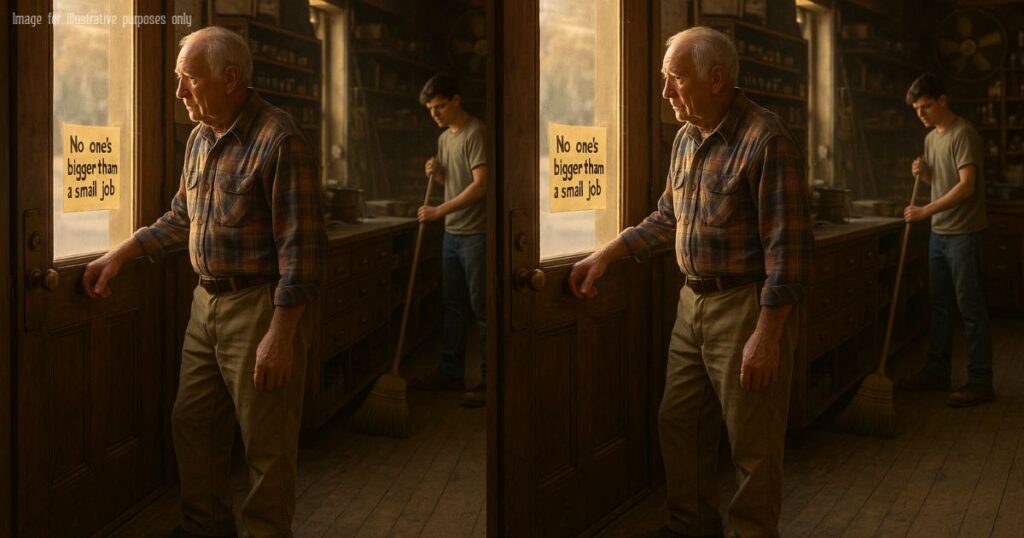By the time I turned eight, I could sort nails faster than most grown men could lie.
That’s what Dad used to say, standing behind the counter with sawdust on his shoulders and grease in the lines of his hands. He wasn’t joking, either. I’d been stacking washers, counting out wingnuts, and wiping shelves with a vinegar rag since I was tall enough to see over the parts bin.
Back in 1958, summers in Maple Hollow weren’t about camps or theme parks. You were either on the baseball field or behind a broom. My buddies played shortstop and made sliding catches on gravel diamonds. I wore a red apron and memorized the difference between a hex bolt and a carriage bolt before I knew long division.
Dad called it “earning your breath.”
“Every man owes the world something,” he’d say. “Start early. Pay with effort.”
The store was older than me, older than him. Grandpa built it in ’21, right after he came home from France with a limp and a head full of noise. Maple Hollow Hardware. Painted in black block letters that peeled in the July sun. One of those places that smelled like machine oil, rubber boots, and stories. The kind of place where a man didn’t need to say much—just nod, pay cash, and carry on.
Mom used to pack us sandwiches and lemonade in a thermos with a handle. We’d sit out back on the loading dock when the noon train rattled past, legs swinging, dust rising. Sometimes Dad would say something real quiet, like: “That’s the sound of progress, kid. Best learn how to live with it—or get out of the way.”
I didn’t hate the work. Truth is, I liked the rhythm of it. The clink of screws on tin trays. The way old men trusted you with their change. The creak of the fan above the till and the way Dad’s face softened when a customer said, “You’ve raised him right, Frank.”
I learned early that dignity wasn’t in what you wore—it was in how you stood. In whether you met a man’s eyes. Whether you shook with your whole hand, not just your fingers. Whether your word held.
Most boys my age were reading comic books. I read receipts.
By the time I was twelve, I could run the counter when Dad slipped out for a smoke. He never said so, but I knew he was proud. Not in a clapping, cheering kind of way. Just quieter. He’d check my till at closing, nod once, and flick the light switch like it was holy.
The world changed fast.
By the mid-‘80s, the big box stores came—first on the highway, then into town like a slow-moving flood. Bright aisles, sliding doors, piped-in music, and prices we couldn’t match. Folks still nodded at Dad at the diner, but fewer came in with their weekend projects.
I was 34 when I bought him out. He never wanted to sell it, not really. But the limp in his knee got worse, and he couldn’t stock shelves like he used to. “The body quits,” he said. “Doesn’t mean the soul should.”
I kept the name. Maple Hollow Hardware. Kept the wood floors and the creaky stools. Even kept the bell above the door that rang like it had a memory.
But I had to make changes. Got a little POS system. Started taking credit cards. Hired two high school kids part-time—neither knew a wrench from a socket, but they were polite enough. I trained them just like Dad trained me: no shortcuts, no complaints, no gum chewing near the paint aisle.
One of them, Joey, had a knack for fixing things. Reminded me of myself at that age. I taught him how to listen more than talk. How to look a customer in the eye and say, “We’ll make it right.” Not because we had to, but because we meant it.
Folks started calling me “Mayor Jim” after I fixed up the old train depot and turned it into a community center. It wasn’t much, but people needed somewhere to go after the factory shut down. We got kids playing checkers again. Old timers teaching them how to sharpen a blade the right way. Some even called it “the soul of Maple Hollow.”
Maybe it was.
In ’96, I ran for mayor. Not because I wanted power—hell, I barely liked the title. But the town needed someone who remembered the old ways. Someone who believed small places still mattered. That a handshake meant more than a contract. That “Made in America” still meant something in the heart.
I never forgot what Dad said when I told him I won: “No one’s ever too big to sweep the floor.”
This morning, I unlocked the store at 6:55. Same as always. Joey’s son, Daniel, was waiting on the steps, fiddling with his phone. He looked up and grinned, wiping his hands on his jeans.
“Morning, Mr. Jim.”
I handed him the keys. “You’re early.”
He shrugged. “Dad says the good ones are.”
I watched him flip the sign to OPEN and sweep the entryway like he meant it.
Inside, the same sun slanted through the same front window. Same brass scale. Same drawer full of nickels. A few more gray hairs, sure—but the heart of it hadn’t changed.
That’s when I saw it.
Right there on the counter, next to the register: a little sign Daniel had taped up. Written in thick black Sharpie, crooked as a fencepost.
“No one’s bigger than a small job.”
I stood there, hand on the doorknob, throat thick with sawdust and something else. And I realized, right then, that the store was going to be just fine.
Because a place only dies when no one remembers what it stood for.


